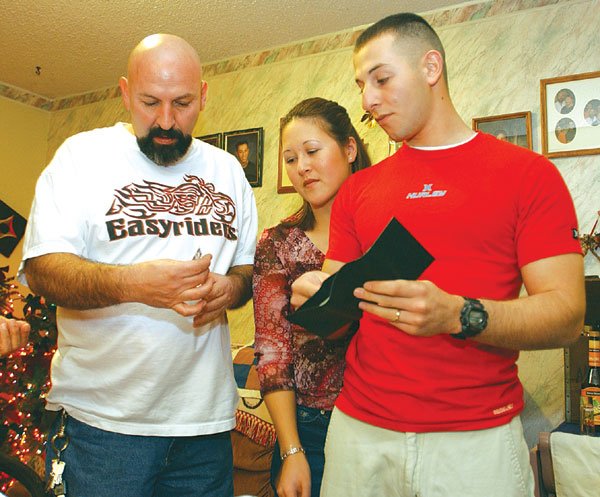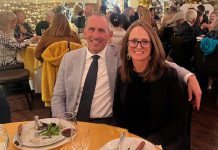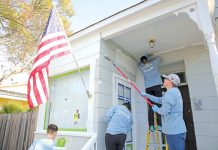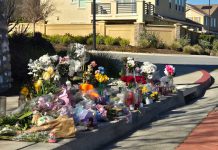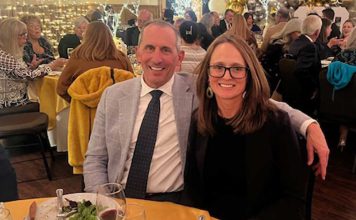Christmas came and went in the Cantu home, but more than a month
later lights still twinkled on the Christmas tree, decorations
still set the room aglow in red and green, and stockings of various
sizes still hung over a dark fireplace.
Christmas came and went in the Cantu home, but more than a month later lights still twinkled on the Christmas tree, decorations still set the room aglow in red and green, and stockings of various sizes still hung over a dark fireplace. Several boxes covered with green and gold wrapping paper sat beneath the tree.
There was only one thing Janie and David Cantu really wanted for Christmas, but they would have to wait until Jan. 24 for their wish to become a reality. Their son David Cantu was coming home.
“Christmas kind of stayed until he got home,” Janie said. “I put up a real tree, but it couldn’t make it.”
David, 21, had been gone for more than six months on the other side of the world, serving in the Army, First Squad of Alpha 1505 Unit, 82nd Airborne Division. As a part of Operation Enduring Freedom, David spent half a year in Afghanistan. He was home on a two-week leave from the service before he needed to return to the base in Fort Bragg, N.C.
“I’d like to thank you all for being here,” Janie told a house filled with 20 family members and friends. “We’re going to celebrate Thanksgiving and Christmas and all the holidays in between.”
David had missed much during his absence. He missed celebrating his own and his brother’s birthday, his wife’s birthday and their anniversary, and many other family events.
But, for now, all of that could be forgotten. Family members came up to David and hugged him. Others went through the hundreds of photos David brought back and asked him about the life of both the soldiers and the people of Afghanistan in the pictures.
David never expected all of this to happen. He joined the military after graduating from Gilroy High School because they offered him $50,000 for college if he served a four-year term. Not long after, he married his high school sweetheart, Stacey.
“I never thought I’d go anywhere,” said David, who joined the military in August of 2000. “Since that day everything changed.”
Though David’s long-term goals of getting out of the military at the end of his term in 2004 and going to school to become a fireman with paramedic training are still the same, his life now has been turned upside down. As he trained at Fort Bragg in 2001, word began to spread that they may get sent to the Middle East.
“There was a lot of rumors going around,” David said. “But I don’t remember when we got called.”
“It was May 30,” Stacey quickly said. “I’ll never forget.”
After a month of training for life in Afghanistan, David and his unit left July 6.
David is part of a nine-man team in his squad, and he is in charge of a group of gunners.
“I’m in charge of how they use their weapons, and when they use their weapons,” he said.
As they headed out toward the Middle East, David wasn’t even sure what his unit was doing there.
“They told us we would be in support of Operation Enduring Freedom,” he said. “They didn’t tell us what we were going to do because they probably didn’t even know what our missions would be.”
Although he couldn’t talk about some of his missions, David said the group often is on the move.
“We were all over the country,” he said. “We were at three main places. From there we could go out and do whatever we needed to do.
“We did a lot of stuff. We walked around a lot looking for things that could be used against us – not so much looking for people because that’s a hard thing to do.”
David’s unit often found ammunition, rifles and other weaponry, much of which was leftover from the Russians years ago. He said most everything they found was outdated.
As he and the other soldiers walked through Afghanistan, they found it took time to get used to the rugged terrain.
“There wasn’t a whole lot of water in the country,” David said. “There is a lot of rocks, gravel, brown. Every once in a while, you’d come across an area with greenery.”
David described the country as looking like a creek bed with many huge caverns with smooth walls from wind erosion. He said there was almost no grass, but rather patches of weeds.
The unit arrived in midsummer and had to adjust to the conditions. But in September, everything changed when the monsoons came.
“In the summer, it was always over 100 degrees,” David said. “Cold was 70 degrees. That, to us, was freezing.”
While the average summer temperature was 110 degrees, David said it got as hot as 130 degrees on some days before two months of rain fell.
“It was every day at noon, give or take 15 minutes,” David said.
As much as 4 inches of rain fell with each daily one-hour storm.
Living quarters also were something to get used to, he said.
“There was 22 of us always sleeping in one tent,” David said. “Our personal space was about 7 foot by 4 foot.”
But, at times, it wasn’t so bad. Soldiers were able to enjoy watching movies, listening to Walkmans, reading books and playing games.
“We had a lot of downtime between missions,” David said. “But our weapons were always with us, even when we went to eat.”
Afghanistan has just one partially paved road, and the way of life is like nothing David had ever seen before.
“The worst part of Mexico would outdo the best part of Afghanistan,” David said. “The culture over there is real simple. All the houses were made of mud. There was nothing over there you would consider fancy.”
Three Afghan families would live in an area the size of David’s home and yard on Wren Avenue, he said.
The people of Afghanistan seemed to interest David. He was able to see first-hand the way of life for Muslims, learning a lot about their culture.
“The people were real friendly,” he said. “They only have a certain amount of food, and they would slaughter their only cow for a feast with you.”
David saw that in the culture of the Middle East, women aren’t given many of the freedoms that men are.
“They weren’t allowed to talk to us,” he said. “We were briefed on that – not to look at any of their females.”
David said he found the ideas of a male-female relationship are very different from the United States.
“They know of marriage,” he said. “They knew what the ring on my finger meant. It was more ownership: That female was owned by somebody.”
David said he found that little boys and girls would come up and talk to them all of the time, but as the girls matured, they stopped.
“As soon as it looks like they are going to develop, they begin to cover their face,” he said. “They grow up knowing this is going to happen.”
However, David said that it seemed the youth of Afghanistan were a sign of hope for the country.
“They were the ones that would come up and talk to us,” he said. “That was one of the big things, the kids were getting smarter than their parents. They would ask us for pens and paper instead of toys.”
Prayer was also a huge part of life for the Muslims, who pray five times each day, David said.
“The would play it over the loudspeaker,” he said. “You could hear it from miles away.”
David said he would see them place their prayer rug down on the ground, and face Mecca and begin to pray.
“It takes about 10 minutes,” he said. “If you laughed or pointed, they would be extremely offended. We were told to turn our backs toward them.”
David said that since the Taliban government was taken out of the country, the people of Afghanistan seem to have a brighter outlook on life, not being afraid to listen to the radio or talk to soldiers, often thanking them for being there.
“You can tell there’s a big burden that’s lifted from them,” he said.
For David, living in another culture has changed the way he lives.
“Everything from my diet to my everyday life,” he said. “I don’t get stressed out so easily.
“I think I came back with a better outlook on day-to-day life, and not taking things for granted.”
The entire Cantu family has come away knowing they won’t take things for granted, either. As they sat down to eat a turkey dinner at their celebration of David’s return, Janie asked everyone to join together to rejoice.
“Before we eat we’d like everyone to hold hands and say a prayer,” she said. “I’d like to thank God my son is back …” she began to say, as tears filled her eyes and her voice began to fail her.
Less than a week later, David’s unit was required to report back to North Carolina, and the Christmas decorations finally came down in the Cantu house. But with a war in Iraq a strong possibility, the Cantu family continues to hope their son will be safe and return to them for the next family reunion – David already was injured once when something exploded during a trash burn, sending shrapnel through his face and injuring two other soldiers.
He is required to be ready to leave the base to go out of the country within 18 hours at all times, and security levels at the base are high. The Cantu family can do little but continue to wait for his calls, which never come often enough, and get updates from Stacey.
“It’s really tough,” Janie said. “I have a lot of faith in God, and I know that no matter what happens with my son, God will be there with him. That’s what keeps me going.”


